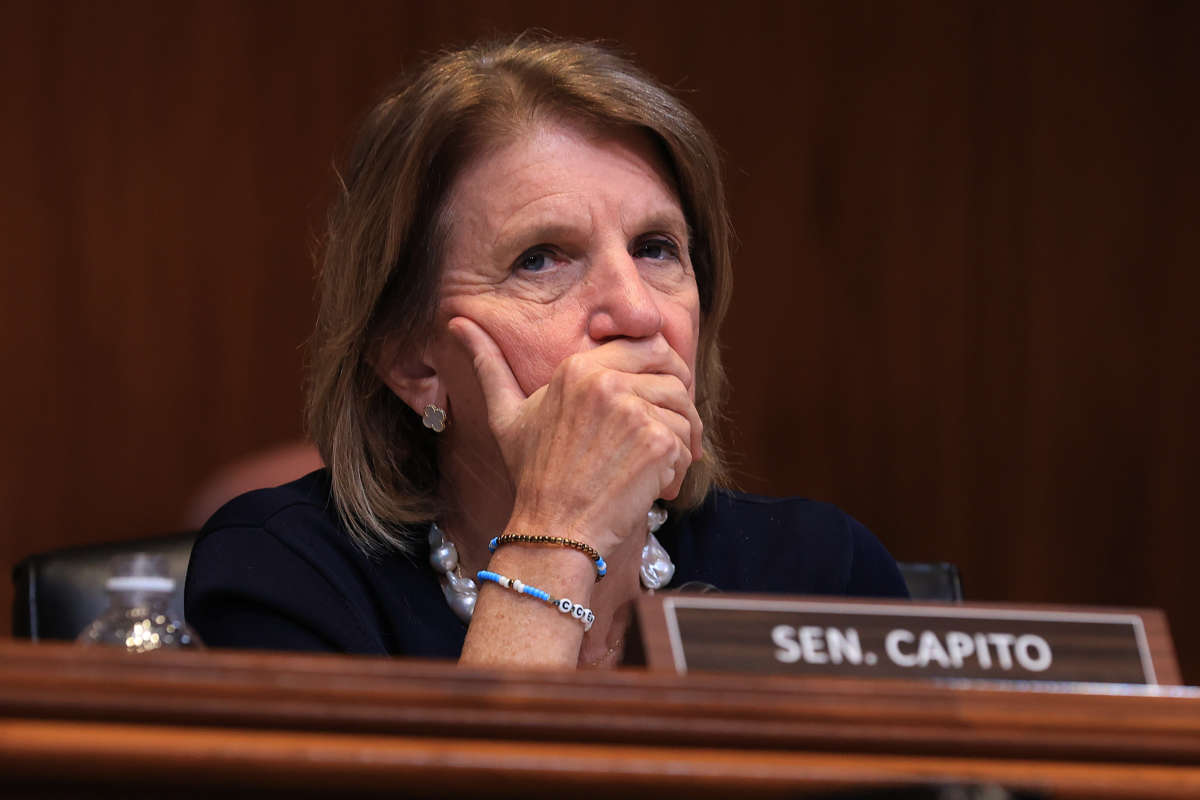Did you know that Truthout is a nonprofit and independently funded by readers like you? If you value what we do, please support our work with a donation.
At a meeting in the name of bipartisanship between President Joe Biden and Sen. Shelley Moore Capito (R-West Virginia) on Wednesday, the president asked that the Senate Republicans bump up their infrastructure offer to $1 trillion in new spending. And, though Republicans have been touting a $1 trillion package, they are reportedly extremely displeased with the president’s request.
Republicans have marketed their plan as being close to $1 trillion in spending. The majority of their $928 billion proposal, however, constitutes baseline spending with just $257 billion in new spending. The senators claim that the president told them in a previous meeting that it was okay that their offer was mostly baseline spending, but it’s unclear what exactly was said.
Regardless, Biden is now asking that the plan include $1 trillion in new spending, a hefty increase from the Republicans’ previous paltry offer. They are expected to make another offer as soon as Friday, when Biden and Capito will be holding another meeting.
At Wednesday’s meeting, the Republicans were still insistent that the bill cannot be paid for with a raise in the tax rate for corporations and the wealthy as Biden has proposed, despite the popularity of the proposal. The GOP has instead offered mostly unrealistic plans to pay for the proposal.
A person familiar with Wednesday’s meeting told Politico that it’s unlikely that the Republicans will come up with a plan that satisfies Biden’s request. “I don’t think Senate Republicans are interested in $1 trillion in new spending, or changing the tax cuts … or raising other taxes — and that’s been clear from day 1,” they said.
It’s unclear where the Republicans will go from here. Biden has already cut his plan by about $600 billion to $1.7 trillion in new spending to appease them and now is offering an even lower threshold, but they evidently can’t even agree to that.
It took the GOP weeks, after all, to come up with a plan that covers only about a quarter of the new spending that the president is asking for. And, despite many weeks of negotiations, the gap between the two proposals is still around $1.4 trillion.
Meanwhile, Democrats and progressives have grown increasingly frustrated with the negotiations that have already gone on longer than expected. Rep. Pramila Jayapal (D-Washington), chair of the Congressional Progressive Caucus, on Tuesday joined the chorus of lawmakers calling for Democrats to move forward with the bill without Republicans.
“It’s time to go big, bold, and fast on an infrastructure plan that repairs bridges and roads — but also guarantees paid leave and child care,” tweeted Jayapal. “The GOP isn’t going to meet us halfway. It’s time to go alone — and get this done.”
Sen. Bernie Sanders (I-Vermont) has been reiterating this point for weeks that “the bottom line is the American people want results.” He pointed out that most Americans don’t think about bipartisanship when they benefit from things like the hugely popular stimulus checks that no Republicans voted for — and warns that further dragging out talks could hurt Democrats’ chances in 2022 and beyond.
Meanwhile, Democratic operatives are fearful that the infrastructure talks could end up looking like the fight over the Affordable Care Act in 2009, reports MSNBC. Republicans, led by Sen. Mitch McConnell (R-Kentucky) dragged on talks over and propagandized about the health care proposal for so long that, by the time it came to a vote, it was heavily politicized and conservatives had successfully turned a majority of the public against it. (Public opinion on the program has since flipped.)
Democrats and progressives warn that Republicans aren’t going to vote for the bill regardless of how many concessions the president makes — after all, Democrats made concessions for the January 6 commission and still failed to get enough Republican votes to overcome the filibuster in the Senate.
Trump is silencing political dissent. We appeal for your support.
Progressive nonprofits are the latest target caught in Trump’s crosshairs. With the aim of eliminating political opposition, Trump and his sycophants are working to curb government funding, constrain private foundations, and even cut tax-exempt status from organizations he dislikes.
We’re concerned, because Truthout is not immune to such bad-faith attacks.
We can only resist Trump’s attacks by cultivating a strong base of support. The right-wing mediasphere is funded comfortably by billionaire owners and venture capitalist philanthropists. At Truthout, we have you.
We’re in the midst of a fundraiser, and as of right now, we have until midnight to raise $13,000. Please take a meaningful action in the fight against authoritarianism: make a one-time or monthly donation to Truthout. If you have the means, please dig deep.
